Japan baseball exports to MLB striking it big in US
- Published
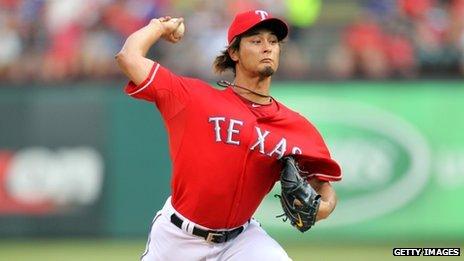
Japanese fans of US baseball are closely watching the fortunes of Yu Darvish after he signed a six-year deal with the Texas Rangers
Far away from Kansas City in the US state of Missouri, die-hard Japanese baseball fans gathered around their television sets earlier this week to watch the 83rd Major League Baseball All-Star Game.
They were utterly disappointed, however, when their star Yu Darvish didn't get to pitch.
He is Japan's latest addition to Major League Baseball (MLB) after signing a six-year contract worth $60m (£38.7m) with the Texas Rangers in January.
It was the most expensive contract that any Japanese player has scored so far.
He has only been pitching in the US for less than half a year, but 25-year-old Mr Darvish was selected for the final and 34th spot on the All-Star team as a result of online voting by MLB fans.
Thanks to fans
"Do I still think I'm worthy or not? Personally, I voted for Peavy," Mr Darvish said before the game, referring to White Sox starter Jake Peavy.
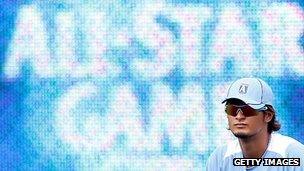
Mr Darvish was the ninth Japanese player to be included in the All-Star Game
"I feel very good. I know the way I got selected was [a] vote by the fans, so I appreciate all the fans who voted for me."
If he was disappointed that he didn't get to pitch on Tuesday, he didn't show it.
"I was able to meet and talk to some of the players so I enjoyed it," he said.
Mr Darvish was the ninth Japanese player to be included in the All-Star Game and the list of others recount the history of Japanese Major Leaguers.
Paving the way
Hideo Nomo was the first Japanese player to join a Major League Baseball team in thirty years, after his debut with the Los Angeles Dodgers in 1995.
He won the Rookie of the Year Award and is often credited with paving the way for other Japanese players.
Don Nomura was his agent who managed to find a way to release him from his contract with his Japanese team.
"Hideo said he always wanted to play in the US especially after he played against international teams in global events such as the Olympics," says Mr Nomura.
"I believe it was his childhood dream."
Mr Nomo pitched with eight different teams before retiring in 2008.
Big hitters
Since Mr Nomo, there have been nearly 50 players who have crossed the Pacific to join MLB.
Ichiro Suzuki, usually known simply as Ichiro, was the first hitter to move to the US in 2001.
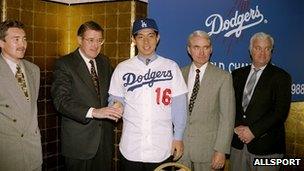
Hideo Nomo was a baseball pathfinder when he moved from Japan to the US in 1995
He continues to play for the Seattle Mariners with a unique swing that has defined his career.
Last month, he also reached the 2,500-hit milestone in his 12th season in the majors.
Another famous hitter is Hideki Matsui, nicknamed Godzilla in Japan.
He played for the New York Yankees between 2003 and 2009 and recently signed a one-year contract with the Tampa Bay Rays.
He was always seen to be on an elite track in Japan as number four hitter for the country's most popular team, the Yomiuri Giants.
Many Japanese reporters and photographers followed him to New York.
Dreams not money
So why do Japanese players want to play in the US?
"The mentality of it is that if there is a challenge out there, the money is good and the league is highly respected, you'd want to give it a go," says Mr Nomura, who has also acted as an agent for many other baseball players.
"Amateurs still dream of joining Japan's professional league but once you enter it, there is something missing."
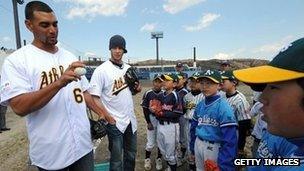
Many young Japanese players dream of playing baseball in the US
He adds: "For example, a salary doesn't grow after a certain point so there is nothing that players feel that they want to achieve within the league."
Mr Darvish had reached the point in 2011 when he earned the top yearly salary of 500m yen ($6.3m; £4m) at his old team Hokkaido Nippon-Ham Fighters.
But for him and many others, it is more about following their dreams.
Take Norichika Aoki for example.
He joined the Milwaukee Brewers in January, but his salary is reportedly one-third or possibly a quarter of what he used to earn in Japan.
The 30-year-old Mr Aoki began the season on the bench with a two-year contract, though he has since been getting regular playing time.
He was quoted as saying "it's not about money" when he expressed a desire to move to the US last year because he "always wanted to play in MLB".
Following the finest
For Japanese companies, however, these players offer great advertising opportunities.
"When Mr Nomo first went to the US in 1995, the American stadiums weren't allowing any Japanese language advertisements," says Kazumasa Kijima of Taihei Professional Advertising.
"But when Ichiro went in 2001 and especially after Matsui joined the Yankees in 2003, the stadiums started to allow us to advertise because of the large amount of money that Japanese companies were willing to spend.
"MLB games attract a lot of interest around the world so Japanese companies see them as a great way to reach the American and overseas markets."
The games are mostly shown by Japan's public broadcaster NHK which is not allowed to show advertisements.
But if an advert is placed behind the hitter on the mound, there is not much broadcasters can do to avoid showing it.
That is exactly how men's beauty salon Dandy House advertises its business there.
Their target audience is specifically Japanese men who are watching the games when the Japanese pitchers make their debut.
'Expensive ads'
"We put an ad behind the hitter for the first pitch of Daisuke Matsuzaka and Yu Darvish," says Naoto Wakishima of Dandy House.
"In one day alone, there was an economic effect worth 20-30bn yen because that particular clip gets repeated over and over on various news programmes.
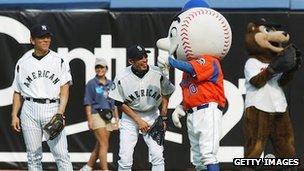
Hideki Matsui and Ichiro Suzuki were two successful Japanese baseball exports to the US
"It's slightly more expensive to place an ad on MLB games and the price is getting higher but it's definitely worth it."
As some of Japan's finest make their way abroad, so does the advertising money.
But it also means that Japan's Nippon Professional Baseball (NPB) has been losing not only its top players but also advertising revenues and audience ratings.
Did Mr Nomura expect so many others to follow Mr Nomo back in 1995?
"No, but I think it's nature taking its course," he says.
"Hideo was determined to have a successful career in the US. He was also representing his country so I think there was a lot of pressure on him.
"But he gave many others hope and confidence that if he could do it, maybe they'd try too."